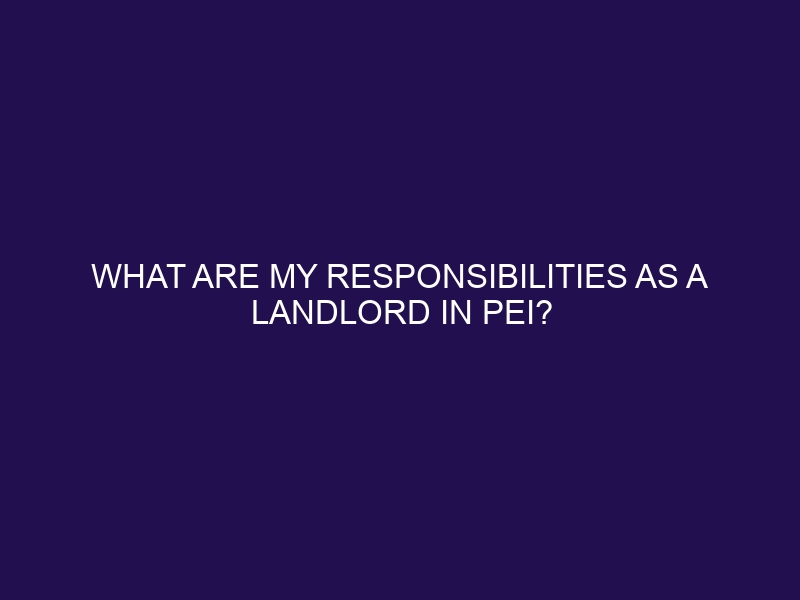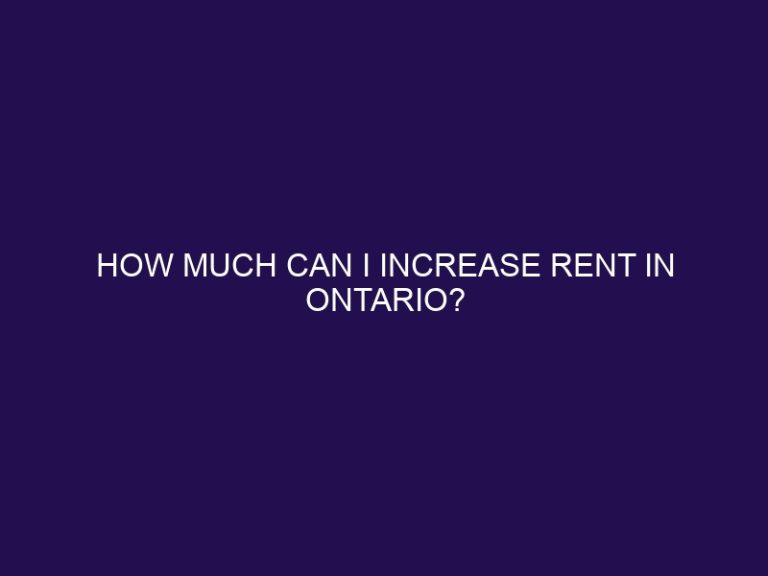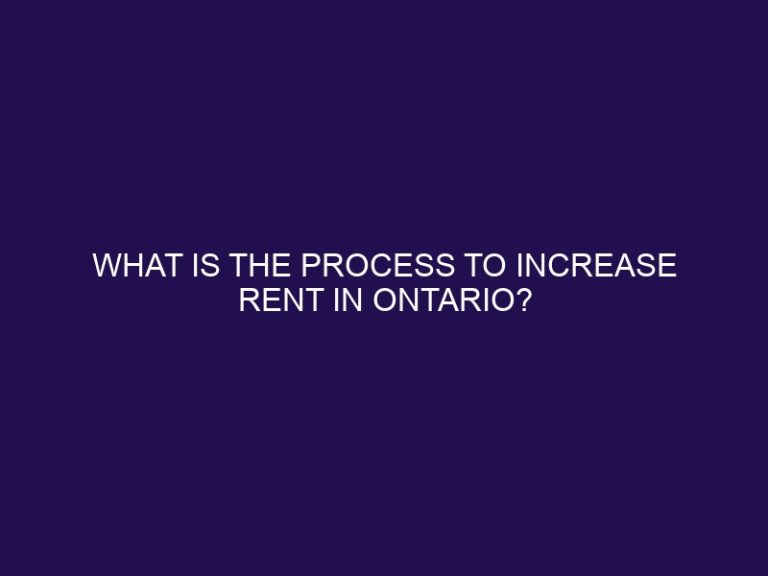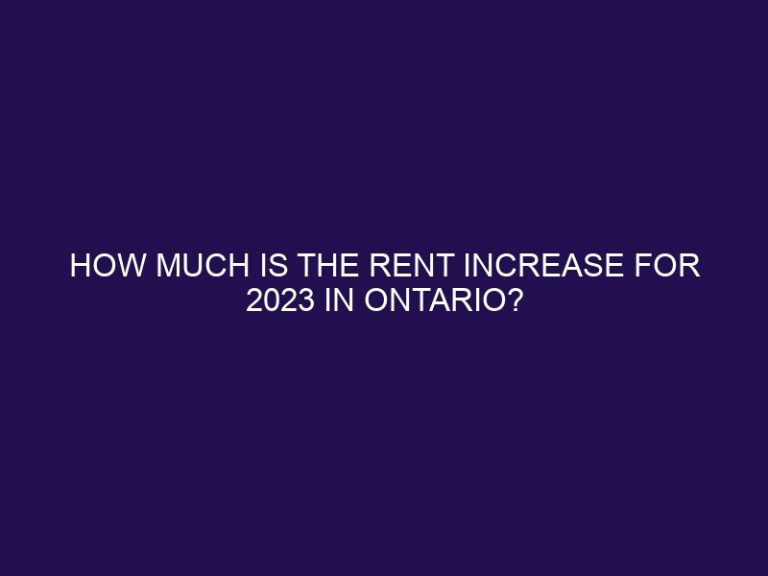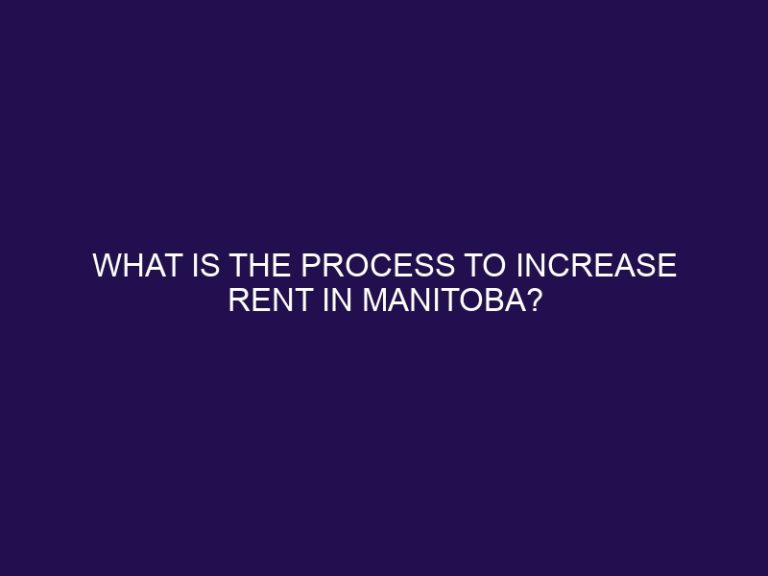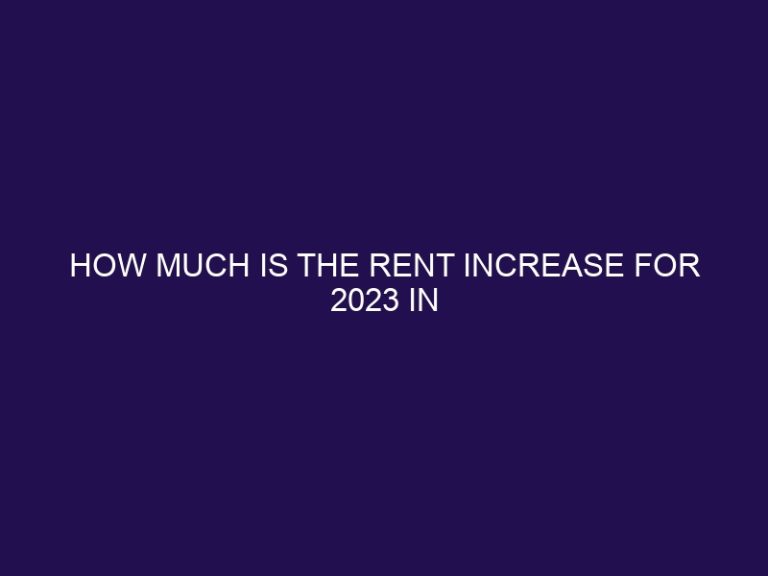What are my responsibilities as a landlord in PEI?
.jpg)
Being a landlord in Prince Edward Island (PEI) comes with various responsibilities and obligations that must be adhered to. Understanding these responsibilities is essential for maintaining a harmonious and legally compliant relationship with tenants. Here is an overview of the key responsibilities of a landlord in PEI:
What is a Landlord?
A landlord is an individual or entity who owns a property and leases it to a tenant in exchange for rent payment.
Legal Responsibilities of a Landlord in PEI:
- Providing and Maintaining the Rental Property: Landlords are responsible for offering a safe and habitable rental property to tenants.
- Ensuring Habitability and Health Standards: Landlords must ensure that the property complies with health and safety standards and is in a habitable condition.
- Collecting and Returning Security Deposits: Landlords are responsible for collecting security deposits within legal limits and returning them within the specified time frame.
- Adhering to Tenancy Agreement Terms: Landlords must uphold the terms and conditions outlined in the tenancy agreement, including rent payment terms and maintenance responsibilities.
- Giving Proper Notice for Entry or Changes: Landlords must provide proper notice to tenants when entering the premises or making any changes that may affect their tenancy.
Tenant Rights and Landlord Obligations in PEI:
- Right to Quiet Enjoyment: Tenants have the right to enjoy the rental property without unnecessary interference from the landlord.
- Right to Repairs and Maintenance: Landlords are obliged to address repairs and maintenance issues promptly to ensure the rental property remains in good condition.
- Right to Privacy: Tenants have the right to privacy, and landlords should respect this by providing notice before entering the premises.
Additional Responsibilities of a Landlord:
- Dealing with Questions and Complaints: Landlords should be responsive to tenant inquiries, requests, and complaints.
- Thoroughly Screening Tenants: It is crucial for landlords to conduct thorough tenant screenings to ensure they select reliable and suitable tenants.
- Keeping Records and Documentation: Landlords should maintain accurate records of rent payments, lease agreements, maintenance requests, and any other relevant documentation.
Tips for Successful Landlord-Tenant Relationships:
- Clear Communication: Establishing open and clear lines of communication with tenants can help prevent misunderstandings and build a positive relationship.
- Prompt Responses to Repairs and Maintenance: Timely response to repair and maintenance requests demonstrates a landlord’s commitment to providing a suitable living environment.
- Fair and Consistent Enforcement of Rules: Landlords should enforce rules and policies consistently and fairly for all tenants to maintain a fair and harmonious living environment.
By understanding and fulfilling these responsibilities, landlords in PEI can establish a strong foundation for a successful and mutually beneficial relationship with their tenants.
Key takeaway:
- Providing and maintaining the rental property: Landlords in PEI have the legal responsibility to ensure that the rental property is in good condition and to make any necessary repairs.
- Adhering to tenancy agreement terms: Landlords must comply with the terms of the tenancy agreement, including rent collection, lease duration, and any other agreed-upon conditions.
- Thoroughly screening tenants: It is important for landlords to carefully vet potential tenants by checking references, conducting background checks, and verifying income to ensure they will be reliable and responsible renters.
What is a Landlord?
A landlord, also known as a property owner, is an individual or entity that owns a property and rents it out to tenants in exchange for payment. So, what is a landlord? A landlord is someone who takes on the responsibility of maintaining the property and ensuring that it meets safety standards. They must also address any concerns or repairs raised by the tenants. Additionally, a landlord plays a crucial role in collecting rent on time and enforcing the terms of the lease agreement. To fulfill their duties, landlords must comply with local laws and regulations governing rental properties. Being a landlord requires excellent communication skills, problem-solving abilities, and a firm commitment to providing a safe and comfortable living environment for tenants.
Legal Responsibilities of a Landlord in PEI
As a landlord in PEI, you have certain legal responsibilities that must be fulfilled. In this section, we will walk you through the key aspects of your role as a landlord, touching upon topics such as ensuring the maintenance and habitability of your rental property, handling security deposits, adhering to tenancy agreement terms, and providing proper notice for entry or changes. By understanding these legal responsibilities, you can navigate the landlord-tenant relationship with confidence and ensure a smooth rental experience.
1. Providing and Maintaining the Rental Property
As a landlord in PEI, your primary responsibility is to provide and maintain the rental property. This involves ensuring the property is safe and habitable for tenants and performing necessary repairs and maintenance.
- Regular inspections and maintenance: Conduct regular inspections to identify any repairs or maintenance needed. Promptly address issues such as plumbing, electrical, or structural problems.
- Property cleanliness: Keep the rental property clean and in good condition. Regularly maintain common areas and address any pest infestations promptly.
- Appliance and equipment maintenance: Ensure that all appliances and equipment provided with the rental property are functioning properly and promptly address any malfunctions.
- Exterior maintenance: Maintain the exterior of the property, including the landscaping, parking areas, and any outdoor common areas.
Fact: According to a study, tenants are more likely to stay longer if landlords actively maintain and provide a well-maintained rental property.
2. Ensuring Habitability and Health Standards
To ensure habitability and health standards as a landlord in PEI, it is essential to meet certain specific responsibilities. These responsibilities encompass creating a safe and clean living environment, providing and maintaining essential services like water, heat, and electricity, and promptly addressing any repairs or health hazards. Regular inspections should be conducted to promptly deal with any potential issues. Failing to meet these standards can have legal consequences and put the well-being of tenants at risk. In a similar vein, I once came across a story about a landlord who neglected their property’s maintenance, resulting in extensive mold growth and health problems for their tenants. This story underscores the significance of prioritizing habitability and health standards to safeguard the well-being of tenants.
3. Collecting and Returning Security Deposits
- Collecting and Returning Security Deposits: This is an essential responsibility of landlords in PEI. It is important to inform tenants about the amount and purpose of the deposit upfront, ensuring clear and mutual understanding.
- Timely Collection: To effectively manage security deposits, landlords should collect the deposit before the tenant moves in. Providing a receipt as proof of payment is also crucial.
- Deposit Protection: It is imperative to keep the deposit in a separate account and refrain from using it for personal expenses. This ensures that the tenant’s money is secure.
- Inspection: Prior to the tenant moving in, conducting a thorough move-in inspection is vital. This allows landlords to document the condition of the property and helps in preventing disputes later on.
- Returning the Deposit: Once the tenancy ends, the deposit should be returned within the specified time frame, which in PEI is 15 days. Landlords should deduct only allowable expenses from the deposit.
- Itemized Deductions: Providing an itemized statement is important. This statement should explain any deductions made from the security deposit.
- Dispute Resolution: In case of any disagreements or disputes regarding the deposit, landlords should aim to resolve them through negotiation or by seeking assistance from a residential tenancy office.
4. Adhering to Tenancy Agreement Terms
Adhering to the terms of a tenancy agreement is imperative for landlords to maintain a positive and legally compliant relationship with their tenants in PEI:
- Thoroughly review the tenancy agreement to comprehend your obligations and responsibilities.
- Ensure that you provide the agreed-upon services, amenities, and utilities as specified in the agreement.
- Respect the agreed-upon rental amount and adhere to any stipulated payment terms.
- Avoid making unauthorized changes to the rental property without obtaining proper consent.
- Adhere to the agreed-upon notice periods for entry or modifications to the rental property.
By adhering to the tenancy agreement terms, you establish trust and maintain a harmonious relationship with your tenants in PEI.
5. Giving Proper Notice for Entry or Changes
Giving Proper Notice for Entry or Changes is an essential obligation for landlords in PEI. To ensure you fulfill this responsibility, follow these key steps:
- Take the time to thoroughly review the tenancy agreement. Familiarize yourself with the specific terms and conditions pertaining to notice requirements.
- Notify your tenants in writing about your intention to enter the rental property or implement any changes. Providing written notice is crucial.
- Be clear about the reason behind the entry or the changes you plan to make. This could include repairs, inspections, or setting rental rates.
- Make sure you give your tenants sufficient advance notice. It is generally recommended to provide them with 24-48 hours’ notice for entry or 30 days’ notice for changes.
- Select the appropriate delivery method for serving the notice. This could be in person, by mail, or electronically, depending on the requirements outlined in the tenancy agreement or legal regulations.
Always remember to respect the privacy and rights of your tenants when giving notice for entry or changes.
Tenant Rights and Landlord Obligations in PEI
When it comes to being a landlord in PEI, it’s crucial to understand the rights of tenants and the obligations that come with the role. In this section, we will dive into the tenant rights and landlord obligations in PEI, covering topics such as the right to quiet enjoyment, the right to repairs and maintenance, and the right to privacy. So, whether you’re a landlord looking to uphold your responsibilities or a tenant wanting to know your rights, this section will provide you with valuable insights and guidance.
1. Right to Quiet Enjoyment
The right to quiet enjoyment is one of the fundamental tenant rights in PEI. Landlords have an obligation to provide their tenants with a peaceful and quiet living environment. They must ensure that the property is free from excessive noise, disturbances, and nuisances, in order to uphold the tenants’ right to quiet enjoyment. This means that landlords should address any issues that may disrupt the tenant’s peaceful enjoyment, such as noisy neighbors or maintenance activities. By respecting and upholding the right to quiet enjoyment, landlords can foster positive relationships with their tenants and create a comfortable living environment.
2. Right to Repairs and Maintenance
- When it comes to the right to repairs and maintenance as a landlord in PEI, it is important to fulfill your obligations to ensure a safe and habitable living environment for your tenants.
- Here are some steps to follow:
– Promptly respond to repair requests from tenants.
– Arrange for qualified professionals to carry out necessary repairs and maintenance.
– Regularly inspect the property to identify any maintenance issues.
– Keep detailed records of all repairs and maintenance work conducted.
– Communicate with tenants about the repair process and any disruptions it may cause.
– Ensure that repairs are completed within a reasonable timeframe. - By adhering to these steps, you can fulfill your responsibilities as a landlord and maintain a positive landlord-tenant relationship.
3. Right to Privacy
Landlords in PEI have a legal obligation to respect their tenants’ right to privacy. This means that landlords cannot enter a rental unit without proper notice or without the tenant’s consent, except in cases of emergency. Landlords should also avoid prying into tenants’ personal lives or belongings. Respecting privacy helps foster a positive landlord-tenant relationship and ensures tenants feel secure in their homes. In a similar vein, there was a story in PEI where a landlord violated a tenant’s right to privacy by entering their rental unit without notice. This breach of privacy resulted in the tenant feeling violated and seeking legal action against the landlord.
Additional Responsibilities of a Landlord
Being a landlord in PEI comes with its fair share of responsibilities. In this section, we will explore the additional duties that landlords have to fulfill. From handling questions and complaints, to thoroughly screening tenants, and keeping meticulous records and documentation; we’ll reveal the crucial aspects of these added responsibilities. So, if you’re a landlord looking to navigate the waters of PEI’s rental market, buckle up as we delve into these essential tasks that can make or break your landlord experience.
1. Dealing with Questions and Complaints
When dealing with questions and complaints as a landlord in PEI, it’s important to handle them promptly and effectively. Here are some steps to follow:
- Be responsive: Respond to tenant inquiries and complaints as soon as possible, demonstrating your commitment to addressing their concerns.
- Listen actively: Give tenants a chance to voice their concerns and actively listen to their needs. This helps build trust and rapport.
- Take action: Investigate the issue thoroughly and take appropriate steps to resolve the problem in a timely manner.
- Communicate clearly: Keep tenants informed about the progress of resolving their questions or complaints. Transparency is key in maintaining a good landlord-tenant relationship.
- Document everything: Maintain accurate records of all communication, including details of the complaint, your response, and any action taken.
By effectively dealing with questions and complaints, you can ensure a positive and respectful landlord-tenant relationship in PEI.
2. Thoroughly Screening Tenants
Thoroughly screening tenants is a key responsibility of landlords in PEI to ensure a reliable and trustworthy rental experience. To accomplish this, landlords should follow a systematic screening process:
- Request rental applications from prospective tenants.
- Conduct background checks to thoroughly screen their employment, income, and rental history.
- Contact previous landlords for references and feedback in order to thoroughly screen prospective tenants.
- Perform credit checks to assess their financial stability during the thorough screening process.
- Interview tenants to understand their lifestyle and compatibility with the rental property while thoroughly screening them.
- Consider additional factors such as criminal records or pet ownership policies during the thorough screening of tenants.
By thoroughly screening tenants, landlords can mitigate the risks of problematic renters and uphold a harmonious landlord-tenant relationship.
3. Keeping Records and Documentation
Keeping records and documentation is a crucial responsibility for landlords in PEI. It helps maintain transparency and protects both parties in case of disputes or legal issues. Here are some steps for effective record-keeping:
- Keep thorough records of lease agreements, rent payments, and security deposits.
- Maintain a log of repairs and maintenance requests, along with dates and details of work done.
- Organize communication with tenants, including emails, letters, and text messages.
- Keep track of any incidents or complaints from neighbors or other tenants.
- Store important documents, such as property insurance policies and inspection reports.
It is crucial to keep records and documentation for at least a few years after a lease ends. This practice can help landlords address any potential legal matters and provide necessary evidence.
Tips for Successful Landlord-Tenant Relationships
Building a strong landlord-tenant relationship is crucial for a successful rental experience. In this section, we’ll uncover valuable tips that can help foster positive interactions between landlords and tenants. From clear communication to prompt responses for repairs and maintenance, and fair enforcement of rules, we’ll explore the key elements that contribute to a harmonious relationship. So, whether you’re a seasoned landlord or just starting out, these insights will guide you towards building fruitful partnerships with your tenants.
1. Clear Communication
As a landlord in PEI, clear communication is absolutely essential in maintaining a positive landlord-tenant relationship. Here are a few helpful tips on how to ensure effective communication between both parties:
By prioritizing and maintaining clear communication with your tenants, you can create a harmonious living environment and proactively address any issues that may arise.
2. Prompt Responses to Repairs and Maintenance
Prompt responses to repairs and maintenance are crucial for landlords to maintain a positive relationship with tenants and ensure the habitability of rental properties. Here are some steps landlords can take to address repairs and maintenance promptly:
By responding promptly to repairs and maintenance, landlords can create a safe and comfortable living environment for tenants while also protecting the value of their rental properties.
3. Fair and Consistent Enforcement of Rules
Fair and consistent enforcement of rules is an essential responsibility for landlords in PEI. It is crucial to ensure a harmonious and fair living environment for all tenants. Landlords should establish clear and reasonable rules, including noise restrictions or pet policies, and diligently enforce them consistently and fairly. By treating all tenants equally and promptly addressing rule violations, landlords uphold the principle of fairness and respect. The effective enforcement of rules not only helps prevent potential conflicts or disputes but also contributes to a peaceful and enjoyable living experience for tenants.
Some Facts About Landlord Responsibilities in PEI:
- ✅ The Rental of Residential Property Act and its Regulations apply to most residential tenants on Prince Edward Island (PEI). (Source: Our Team)
- ✅ The laws outline the rights and responsibilities of both landlords and tenants in PEI. (Source: Our Team)
- ✅ There are two publications available: “Renting on PEI – A Guide for Tenants” and “Renting on PEI – A Guide for Landlords.” (Source: Our Team)
- ✅ The tenant guide provides information on the rights and responsibilities of tenants in PEI and explains what actions can be taken if the law is not being respected. (Source: Our Team)
- ✅ The landlord guide is useful for those considering renting out their property or buying a rental property in PEI, as it includes information on rights and responsibilities for landlords and property managers. (Source: Our Team)
Frequently Asked Questions
What are my responsibilities as a landlord in Prince Edward Island (PEI)?
As a landlord in PEI, you have certain responsibilities under the Rental of Residential Property Act and its Regulations. Here are some key responsibilities you should be aware of:
Do these responsibilities apply to property managers?
Yes, these responsibilities also apply to property managers who oversee residential rental properties in PEI. Whether you are a landlord or a property manager, you are required to follow the laws outlined in the Rental of Residential Property Act.
What are the rights and responsibilities of residential tenants in PEI?
Residential tenants in PEI also have rights and responsibilities that are outlined in the Rental of Residential Property Act. These include the right to live in a safe and habitable property, the responsibility to pay rent on time, and the right to have repairs done in a timely manner. It is important to familiarize yourself with these rights and responsibilities as a landlord.
What actions can I take if a tenant is not following the law?
If you believe a tenant is not following the law, there are steps you can take. First, communicate with the tenant and try to resolve the issue. If this does not work, you can contact the Residential Tenancies Office in PEI for guidance on how to proceed. It is important to follow the proper legal procedures when dealing with any tenant issues.
Are there any resources available to guide me in my role as a landlord?
Yes, there are two publications available in Prince Edward Island: “Renting on PEI – A Guide for Tenants” and “Renting on PEI – A Guide for Landlords.” These guides provide comprehensive information on the rights and responsibilities of both landlords and tenants, as well as guidance on what to do if the law is not being respected. They are available in multiple languages.
I’m considering renting out my property. How can the landlord guide help me?
The landlord guide is a valuable resource for those considering renting out their property in PEI. It provides information on the rights and responsibilities of landlords and property managers, as well as useful tips and guidelines for renting out residential properties. Whether you are a new landlord or experienced in property management, the guide can help you navigate the rental process effectively.

